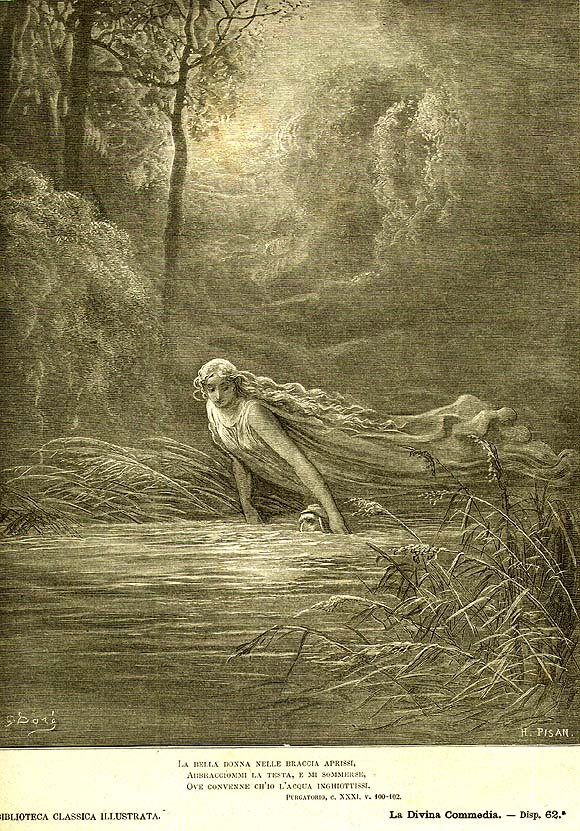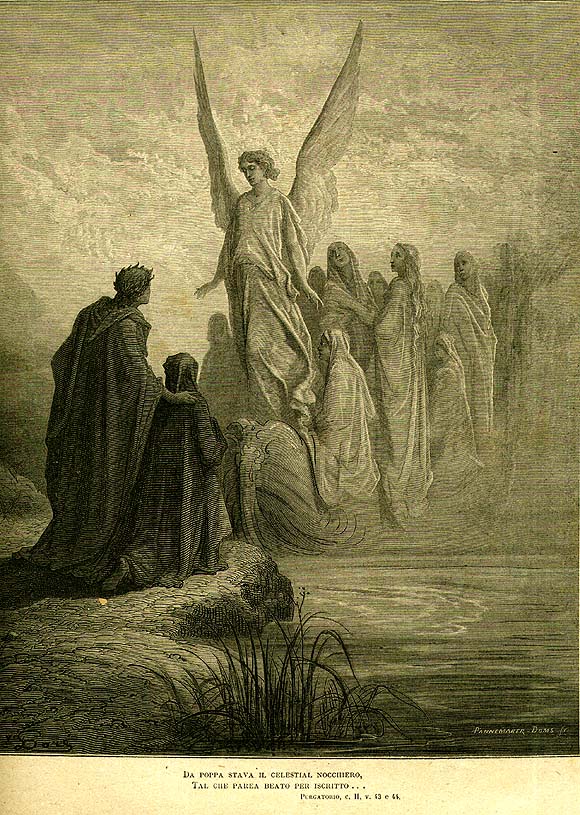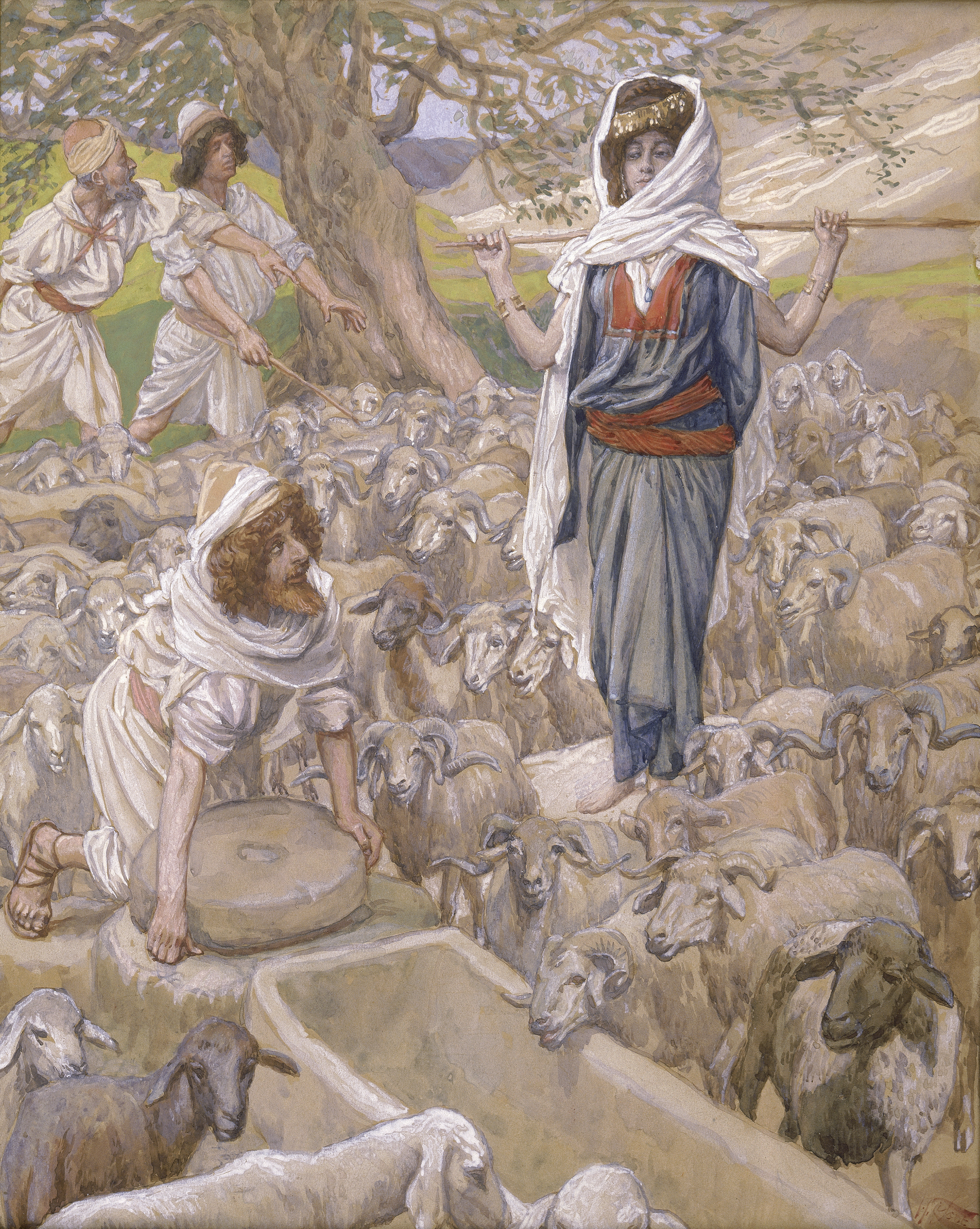|
Matelda
Matelda, anglicized as Matilda in some translations, is a minor character in Dante Alighieri's ''Purgatorio'', the second canticle of the ''Divine Comedy.'' She is present in the final six cantos of the canticle, but is unnamed until Canto XXXIII. While Dante makes Matelda's function as a baptizer in the Earthly Paradise clear, commentators have disagreed about what historical figure she is intended to represent, if any. Role in ''Purgatorio'' Matelda first appears in Canto XXVIII of ''Purgatorio''. As Dante begins to explore the Earthly Paradise (also known as the Garden of Eden), his movement is stopped by a stream, and he notices a woman collecting flowers and singing on its opposite bank. Taking her to be a woman in love, he asks her to come closer so that he can better hear her song, which reminds him of Proserpina before she was abducted by Hades and "lost springtime" (''Purgatorio'' XXVIII, 48–51). Matelda approaches the water and Dante, who is stricken by her beauty ... [...More Info...] [...Related Items...] OR: [Wikipedia] [Google] [Baidu] |
Mechtilde
Mechtilde of Hackeborn, also known as Mechtilde of Helfta (1240/1241 – 19 November 1298), was a Lower Saxony, Saxon Christianity, Christian saint (from what is now Germany) and a Benedictine nun. She was famous for her musical talents, gifted with a beautiful voice. At the age of 50, Mechtilde went through a grave spiritual crisis, as well as physical suffering. In the modern Benedictine calendar, her feast is celebrated on the anniversary of her death, November 19. She died in the convent of Helfta, near Eisleben. Birth and Baptism Born Matilda von Hackeborn-Wippra, in 1240 or 1241, she belonged to one of the noblest and most powerful Thuringian families; her sister was the illustrious Abbess Gertrude of Hackeborn. The family of Hackeborn belonged to a dynasty of Barons in Thuringia who were related to the Hohenstaufen family and had possessions in northern Thuringia and in the Harz Mountains. Some writers have considered that Mechtilde von Hackeborn and Mechtilde von Wip ... [...More Info...] [...Related Items...] OR: [Wikipedia] [Google] [Baidu] |
Mechthild Of Magdeburg
Mechthild (or Mechtild, Matilda, Matelda) of Magdeburg (c. 1207 – c. 1282/1294), a Beguine, was a Christian medieval mystic, whose book ''Das fließende Licht der Gottheit'' (''The Flowing Light of Divinity'') is a compendium of visions, prayers, dialogues and mystical accounts. She was the first mystic to write in German. Life Definite biographical information about Mechthild is scarce; what is known of her life comes largely from scattered hints in her work. She was born into a noble Saxon family. She had her first vision of the Holy Spirit at the age of twelve.''Flowing Light'' 4.2. In 1230 she left her home and “renounced worldly honour and worldly riches” to become a Beguine at Magdeburg. There, like Hadewijch of Antwerp, she seems to have exercised a position of authority in a Beguine community. In Magdeburg she became acquainted with the Dominicans and became a Dominican tertiary. [...More Info...] [...Related Items...] OR: [Wikipedia] [Google] [Baidu] |
Matilda Of Tuscany
Matilda of Tuscany ( it, Matilde di Canossa , la, Matilda, ; 1046 – 24 July 1115 or Matilda of Canossa after her ancestral castle of Canossa), also referred to as ("the Great Countess"), was a member of the House of Canossa (also known as the Attonids) in the second half of the eleventh century. Matilda was one of the most important governing figures of the Italian Middle Ages. She reigned in a period of constant battles, political intrigues and Roman-Catholic excommunications, and was able to demonstrate an innate and skilled strategic leadership capacity in both military and diplomatic matters. She ruled as a feudal margravine and, as a relative of the imperial Salian dynasty, she brokered a settlement in the so-called Investiture Controversy. In this extensive conflict with the emerging reform Papacy over the relationship between spiritual (''sacerdotium'') and secular (''regnum'') power, Pope Gregory VII dismissed and excommunicated the Holy Roman Emperor Henry IV in 1 ... [...More Info...] [...Related Items...] OR: [Wikipedia] [Google] [Baidu] |
Purgatorio
''Purgatorio'' (; Italian for "Purgatory") is the second part of Dante's ''Divine Comedy'', following the ''Inferno'' and preceding the '' Paradiso''. The poem was written in the early 14th century. It is an allegory telling of the climb of Dante up the Mount of Purgatory, guided by the Roman poet Virgil—except for the last four cantos, at which point Beatrice takes over as Dante's guide. Allegorically, ''Purgatorio'' represents the penitent Christian life.Dorothy L. Sayers, ''Purgatory'', notes on Canto VII. In describing the climb Dante discusses the nature of sin, examples of vice and virtue, as well as moral issues in politics and in the Church. The poem posits the theory that all sins arise from love – either perverted love directed towards others' harm, or deficient love, or the disordered or excessive love of good things. Overview of Purgatory In the poem, Purgatory is depicted as an island-mountain in the Southern Hemisphere. This realm is divided into three par ... [...More Info...] [...Related Items...] OR: [Wikipedia] [Google] [Baidu] |
Pur 31
Pur or PUR may refer to: Arts, entertainment, and media * Pur (band), a German band * Pur, a song by the Cocteau Twins People * Necla Pur (born 1943), Turkish economist and professor * Quraish Pur (1932–2013), Pakistani scholar, writer, and television host Places Villages * Pur, Belgaum, Karnataka, India, a village * Pur, Bhiwani, Haryana, India, a village * Pur, Bhilwara, Rajasthan, India, a village * Pur, Iran, a village Rivers * Pur (Russia), a river in Yamalo-Nenets, Russia * Pur River (India), a river Gujarat, India Other uses * Pur (brand), a brand of water filters * Pur (placename element), placename suffix used in South Asia * ''Pacific Union Recorder'', see List of Seventh-day Adventist periodicals * ''Partidul Umanist Român'' (Romanian Humanist Party), former name of the Conservative Party (Romania) * Polyurethane, a polymeric material See also * Purr A purr is a tonal fluttering sound made by some species of felids and two species of genets. It varies in ... [...More Info...] [...Related Items...] OR: [Wikipedia] [Google] [Baidu] |
Paradiso (Dante)
''Paradiso'' (; Italian for "Paradise" or "Heaven") is the third and final part of Dante's ''Divine Comedy'', following the ''Inferno'' and the ''Purgatorio''. It is an allegory telling of Dante's journey through Heaven, guided by Beatrice, who symbolises theology. In the poem, Paradise is depicted as a series of concentric spheres surrounding the Earth, consisting of the Moon, Mercury, Venus, the Sun, Mars, Jupiter, Saturn, the Fixed Stars, the Primum Mobile and finally, the Empyrean. It was written in the early 14th century. Allegorically, the poem represents the soul's ascent to God. Introduction The ''Paradiso'' begins at the top of Mount Purgatory, called the Earthly Paradise (i.e. the Garden of Eden), at noon on Wednesday, March 30 (or April 13), 1300, following Easter Sunday. Dante's journey through Paradise takes approximately twenty-four hours, which indicates that the entire journey of the ''Divine Comedy'' has taken one week, Thursday evening (''Inferno'' I and II ... [...More Info...] [...Related Items...] OR: [Wikipedia] [Google] [Baidu] |
Henry IV, Holy Roman Emperor
Henry IV (german: Heinrich IV; 11 November 1050 – 7 August 1106) was Holy Roman Emperor from 1084 to 1105, King of Germany from 1054 to 1105, King of Italy and Burgundy from 1056 to 1105, and Duke of Bavaria from 1052 to 1054. He was the son of Henry III, Holy Roman Emperor—the second monarch of the Salian dynasty—and Agnes of Poitou. After his father's death on 5 October 1056, Henry was placed under his mother's guardianship. She made grants to German aristocrats to secure their support. Unlike her late husband, she could not control the election of the popes, thus the idea of the "liberty of the Church" strengthened during her rule. Taking advantage of her weakness, Archbishop Anno II of Cologne kidnapped Henry in April 1062. He administered Germany until Henry came of age in 1065. Henry endeavoured to recover the royal estates that had been lost during his minority. He employed low-ranking officials to carry out his new policies, causing discontent in Saxony and Thuri ... [...More Info...] [...Related Items...] OR: [Wikipedia] [Google] [Baidu] |
Pope Gregory VII
Pope Gregory VII ( la, Gregorius VII; 1015 – 25 May 1085), born Hildebrand of Sovana ( it, Ildebrando di Soana), was head of the Catholic Church and ruler of the Papal States from 22 April 1073 to his death in 1085. He is venerated as a saint in the Catholic Church. One of the great reforming popes, he is perhaps best known for the part he played in the Investiture Controversy, his dispute with Emperor Henry IV that affirmed the primacy of papal authority and the new canon law governing the election of the pope by the College of Cardinals. He was also at the forefront of developments in the relationship between the emperor and the papacy during the years before he became pope. He was the first pope in several centuries to rigorously enforce the Western Church's ancient policy of celibacy for the clergy and also attacked the practice of simony. Gregory VII excommunicated Henry IV three times. Consequently, Henry IV would appoint Antipope Clement III to oppose him in the polit ... [...More Info...] [...Related Items...] OR: [Wikipedia] [Google] [Baidu] |
Matilda Of Ringelheim
Matilda of Ringelheim ( 892 – 14 March 968), also known as Saint Matilda, was a Saxon noblewoman. Due to her marriage to Henry I in 909, she became the first Ottonian queen. Her eldest son, Otto I, restored the Holy Roman Empire in 962. Matilda founded several spiritual institutions and women's convents. She was considered to be extremely pious, righteous and charitable. Matilda's two hagiographical biographies and ''The Deeds of the Saxons'' serve as authoritative sources about her life and work. Early life and marriage with Henry I Matilda, daughter of Reinhild and the Saxon count Dietrich (himself a descendant of the Saxon duke Widukind who fought against Charlemagne) was born in around 892, and was raised by her grandmother Matilda in Herford Abbey. She had three sisters; Amalrada, Bia and Fridarun, who married Charles III, king of West Francia; and a brother, Beuve II, the Bishop of Châlons-sur-Marne. Due to Fridarun's marriage to count Wichmann the Elder, there was an ... [...More Info...] [...Related Items...] OR: [Wikipedia] [Google] [Baidu] |
Rachel
Rachel () was a Biblical figure, the favorite of Jacob's two wives, and the mother of Joseph and Benjamin, two of the twelve progenitors of the tribes of Israel. Rachel's father was Laban. Her older sister was Leah, Jacob's first wife. Her aunt Rebecca was Jacob's mother. After Leah conceived again, Rachel was finally blessed with a son, Joseph, who would become Jacob's favorite child. Children Rachel's son Joseph was destined to be the leader of Israel's tribes between exile and nationhood. This role is exemplified in the Biblical story of Joseph, who prepared the way in Egypt for his family's exile there. After Joseph's birth, Jacob decided to return to the land of Canaan with his family. Fearing that Laban would deter him, he fled with his two wives, Leah and Rachel, and twelve children without informing his father-in-law. Laban pursued him and accused him of stealing his idols. Indeed, Rachel had taken her father's idols, hidden them inside her camel's seat cushion, an ... [...More Info...] [...Related Items...] OR: [Wikipedia] [Google] [Baidu] |
Leah
Leah ''La'ya;'' from (; ) appears in the Hebrew Bible as one of the two wives of the Biblical patriarch Jacob. Leah was Jacob's first wife, and the older sister of his second (and favored) wife Rachel. She is the mother of Jacob's first son Reuben. She has three more sons, namely Simeon, Levi and Judah, but does not bear another son until Rachel offers her a night with Jacob in exchange for some mandrake root (, ''dûdâ'îm''). Leah gives birth to two more sons after this, Issachar and Zebulun, and to Jacob's only daughter, Dinah. Biblical narrative Overview Leah first appears in the Book of Genesis, in Genesis 29, which describes her as the daughter of Laban and the older sister of Rachel, and is said to not compare to Rachel's physical beauty and that she has tender eyes.) (Genesis 29:17). It is debated as to whether the adjective "tender" () should be taken to mean "delicate and soft" or "weary". Some translations say that it may have meant blue or light colored eyes. ... [...More Info...] [...Related Items...] OR: [Wikipedia] [Google] [Baidu] |
Brotherly Love (philosophy)
Brotherly love in the biblical sense is an extension of the natural affection associated with near kin, toward the greater community of fellow believers, that goes beyond the mere duty in to "love thy neighbour as thyself", and shows itself as "unfeigned love" from a "pure heart", that extends an unconditional hand of friendship that loves when not loved back, that gives without getting, and ever looks for what is best in others. Brotherly love ''The following is based on the public domain article Brotherly Love found in the 1906 Jewish Encyclopedia'' A Biblical command Brotherly love is the love for one's fellow-man as a brother. The expression is taken from the Greek word Φιλαδελφία (Philadelphia = "love of brothers"), which trait distinguished the Early Christian communities. – and express the idea of Christian fellowship and fraternity. It was also important in the Essene brotherhoods, who practised brotherly love as a special virtue. Brotherly love ... [...More Info...] [...Related Items...] OR: [Wikipedia] [Google] [Baidu] |







